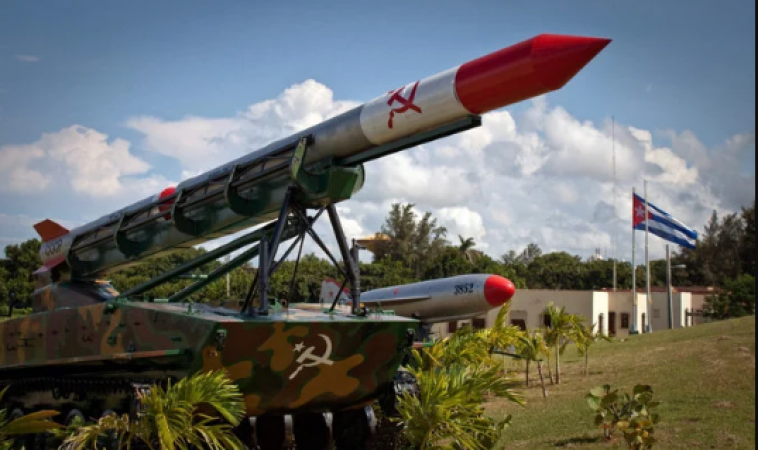
WASHINGTON: For the past 60 years, the Cuban Missile Crisis has stood as a terrifying reminder of how close the world has come to nuclear war – and how skilled leadership has avoided it.
With Russian President Vladimir Putin branding a nuclear option in Ukraine, the threat has receded, but experts are less certain this time about ending it.
In early October, US President Joe Biden issued a blunt warning that the world was facing nuclear annihilation for the first time since 1962, saying Putin was "not joking" about using ultra-destructive weapons. because his army was "underperforming" itself. invasion of Ukraine.
Also Read: US ambassador to Lebanon the following week to sign maritime agreement
Biden said he was looking for an "off-ramp" for Putin. However, there is no indication that Putin is eager to accept one.
"I believe in this position, more than any other position since 1962," said George Perkovic, vice president of studies at the Carnegie Endowment for International Peace.
"I've been in this region for 40 years, and it's the most difficult situation because you have a nuclear-armed state, Russia, whose leader has defined the state of existence."
Unlike 1962, the world now faces several nuclear flashpoints, including signs that North Korea is preparing for another nuclear test, tensions between nuclear-armed India and Pakistan, and Iran intensifying nuclear work. .
However, Ukraine poses unique risks as the conflict pits two of the world's most powerful nuclear powers against each other. Any Russian attack would be expected to use tactical nuclear weapons, which are fired on battlefields rather than across continents, but Biden warned that once a nuclear weapon is used "with Armageddon." Not ending" is difficult.
Putin, who has questioned the historical legitimacy of Ukraine, has declared four zones and suggested that an attack on "Russian" territory or direct Western intervention could lead to Russia using a nuclear weapon.
The brutal war, which has already lasted eight months, is radically different from the Cuban crisis, in which the question was how to prevent escalation of Cold War conflict over the discovery of Soviet nuclear weapons on the island.
In one of his taped deliberations, US President John F. Kennedy said that European allies thought Washington was "neurotic" by its fixation on Cuba, which is about 90 miles (140 km) from Florida, and that its US intervention has a long history.
Also Read: F-16 fighter jets intercept Russian bombers flying near Alaska
"Ukraine is far more important to America's allies than Cuba," said Virginia Cold War historian, Mark Selverstone.
"Putin seems to be willing to redraw the borders of Europe, which is terrible for Europeans."
While Soviet leader Nikita Khrushchev's intentions were broader, less harsh than Putin's, Moscow sought to close the missile gap with the US and leverage with the West over divided Berlin.
The political stakes were high for Kennedy, who had been humiliated a year earlier by the CIA Bay of Pigs' unsuccessful attack to overthrow communist revolutionary Fidel Castro and was just days away from Congressional elections.
However, Kennedy rejected the air strikes and instead imposed a naval "quarantine" against further Soviet shipments, avoiding the term blockade, which would have been considered an act of war.
Moscow withdrew after Kennedy promised not to invade Cuba and quietly withdraw American nuclear missiles from Turkey.
"The most important thing for Kennedy was to reduce the possibility of a nuclear exchange," explained Selverston. I'm not sure it's on Vladimir Putin's mind right now. In fact, it appears to be moving east."
In both 1962 and now, nuclear powers faced an additional layer of uncertainty from ground allies.
On October 27, 1962, an American U-2 spy plane was shot down over Cuba, just as Khrushchev and Kennedy were exchanging messages.
Kennedy ignored the call to retaliate, assuming - well, as history has proved - that the order to fire came from Cuba, not the Soviet Union.
The next day, Khrushchev announced an agreement, in which his son later wrote that he feared the situation would spiral out of control.
In Ukraine, President Volodymyr Zelensky has vowed to speed up and reclaim all occupied territories from Russia.
The US has sent billions of dollars worth of weapons to Ukraine, but Biden has said he will not risk a "World War 3" by sending attack missiles to Russia.
Also Read: American pension funds rush to evaluate interest rate risk
"Both Zelensky and Putin have taken maximalist positions, extending their red lines, while Kennedy and Khrushchev did the opposite in 1962," Selverston explained.
Perkovich stated that Biden, for whom he worked as a senator, was as calm and well-versed in crisis management as any US president.
However, he stated that 2022 will also be a different era. Russia agreed in 1962 to keep Kennedy's agreement to withdraw US missiles from Turkey a secret, recognising the political risks to the president.
"Many crises in history have been resolved through secret diplomacy," said Perkovich.
"Can you imagine keeping a deal like that secret in this day and age, with open-source intelligence and social media?"